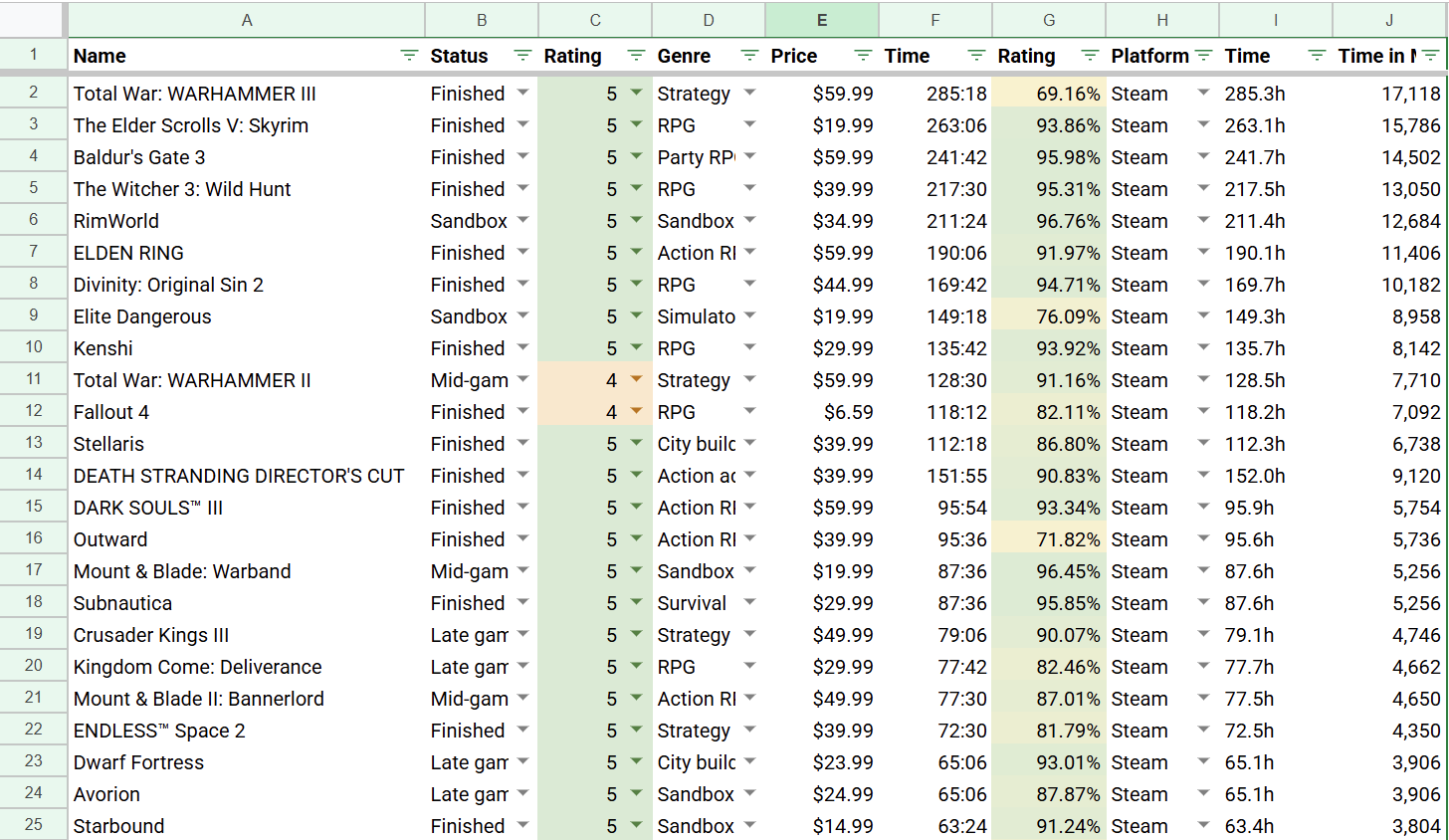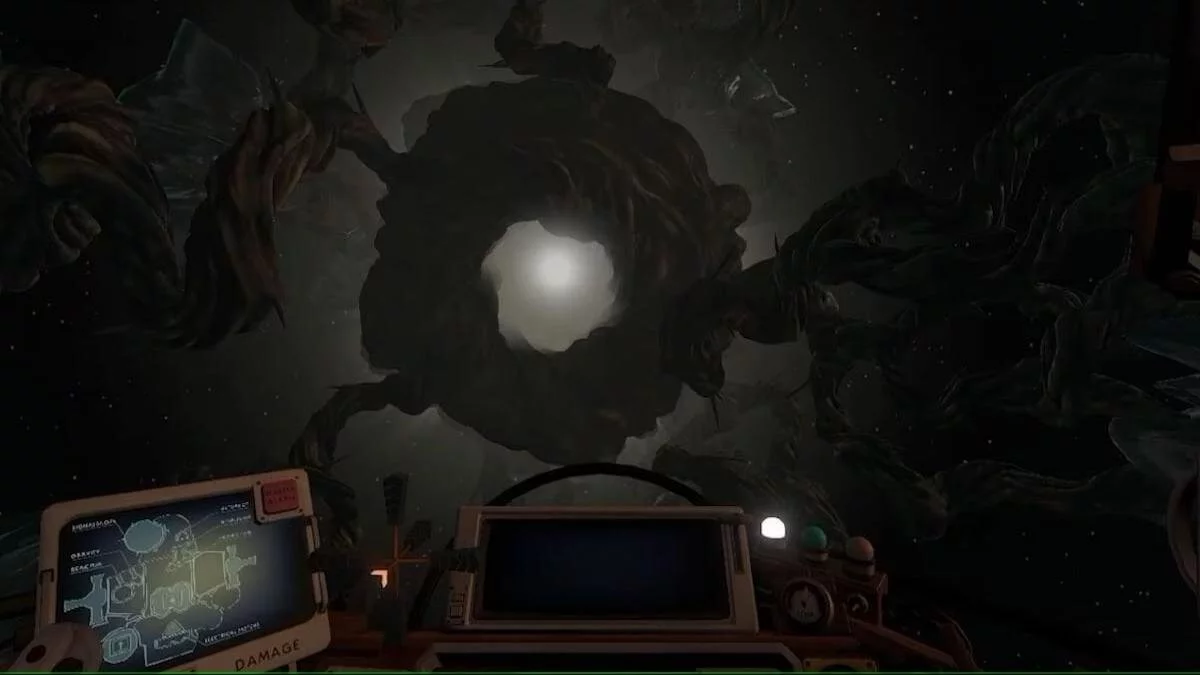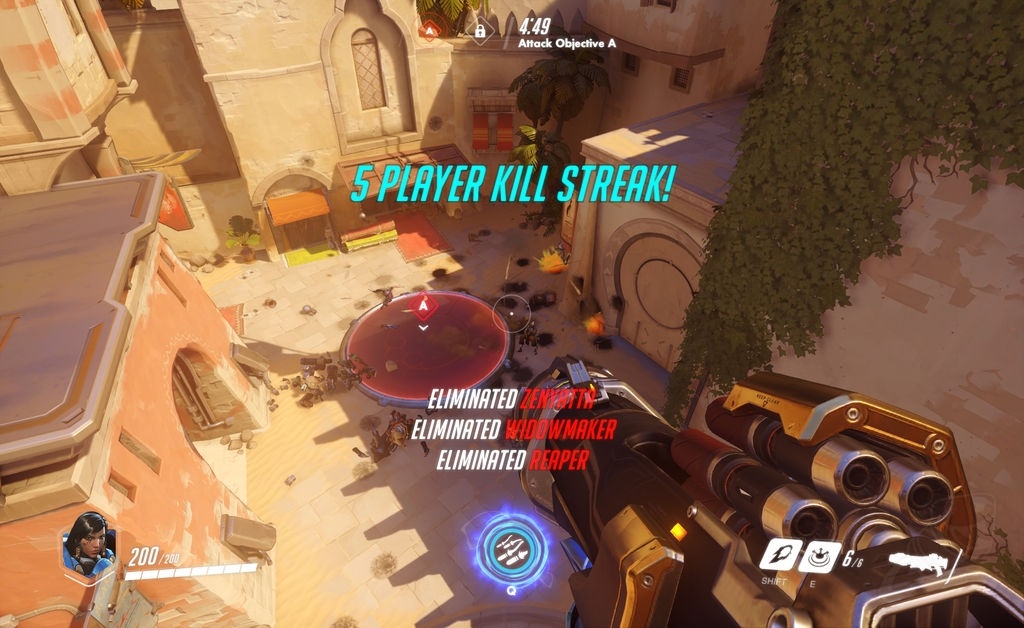The tyranny of my gaming backlog
I own at least 584 games. That’s a combination of Steam, GOG, Epic, and Nintendo shops, plus some smaller launchers like Battle.net or EA Origins.
That’s a lot of games, and naturally there are only so many games I played through. Here’s a little statistic:
| Status | # | % |
|---|---|---|
| Completed | 92 | 16% |
| Played, but haven’t completed | 291 | 50% |
| Unplayed | 201 | 34% |
Let me break it down for you: out of 584 games I’ve tracked, I’ve only completed a fraction, and whopping 34% of the games I own I haven’t even played. And those 84% of games I haven’t “beaten” used to make up my backlog, and it was suffocating.
But before I talk more about my backlog, allow me to meander and talk about the value of games. With mild OCD, I get obsessed with spreadsheets, charts, analysis, and optimization. And it was only a matter of time I put together a spreadsheet to calculate “value of games per hour”, alongside my own scores, Metacritic scores, and various other metadata. Here’s the spreadsheet I made in 2019 (with a fresh pull of data from last year):
 When I talk about tyranny of the backlog, this is what I mean.
When I talk about tyranny of the backlog, this is what I mean.
I felt like I could crack the code of what makes me like which games, and what formula can be applied to pick out the best games out there. I was young(er) and naive(r?), thinking art can be oh-so-easily quantified.
But I did find a few interesting things about how I enjoy games. Expectedly, I play many hours of games I like - Skyrim, The Witcher 3, all in order. But there was a small subset of games I scored extremely highly - like the Outer Wilds, Stray, or Doki Doki Literature Club - short games, but games I enjoyed immensely.
Just because I spend a long time playing a game doesn’t make that game good. Reducing art to dollar values is a tragically capitalist approach to a leisurely activity. Worse, just because I spent a tremendous amount of time playing a game doesn’t mean it left a major imprint on me. Look, I’m ashamed to admit I clocked in over 600 hours in Overwatch back when it was released, and I don’t think I enjoyed my time as much as the hours might suggest. Somehow, the numbers of hours played does not always equal fun.
 Outer Wilds: This screenshot alone invokes more memories than hundreds of hours I’ve put into, say, online shooters.
Outer Wilds: This screenshot alone invokes more memories than hundreds of hours I’ve put into, say, online shooters.
So yeah, 584 games in my library. That’s a whole lot of games, but I wouldn’t call myself an avid game collector. I think this is a symptom of the digital marketplaces and ease of access: we’re living in an era of infinite access. Want a game? It’s trivial to buy and download. You get access to hundreds of titles through subscriptions like the PC Game Pass. Frequent game sales enable you to pick up interesting titles for cheap. To sit in your library, forever, probably.
I know I myself have been engaging in more digital hoarding than I’d like to, and the act of buying a game isn’t really a significant event. When I was a kid I’d go to a local video game store, look through the entire catalogue for hours (yeah, I had more time too), and if I’m lucky - come home with a game to play. I’d play that game for weeks or even months, because that is the game that I bought, and I won’t get another one for quite some time.
That wasn’t ideal of course, because if a game misadvertised itself, or if the game wasn’t my cup of tea - I’d either have to play it, or boot up an old game (which I already put considerable amount of time in). The times have changed, and the choice doesn’t feel as big anymore. As an adult, I have more disposable income. I have every game ever made under my fingertips. I have less time, and my time is more precious. There’s a moment somewhere where the deliberate act of ownership was replaced by the hollow comfort of easy access.
A few times I caught myself buying a game I didn’t really enjoy that much on a different console. I don’t recall what those games were, but they were critically acclaimed, and I thought maybe this time I would enjoy them. I watched the trailer, I read a few reviews, and I imagined how much fun I could have. Disregarding the fact that I already own the game on another platform, and no, I didn’t have much fun at all.
 Overwatch: I had a lot of fun engaging with the community and following Overwatch League in early days of the game. Most past matches are blending together now.
Overwatch: I had a lot of fun engaging with the community and following Overwatch League in early days of the game. Most past matches are blending together now.
So much choice can lead to decision paralysis. Trader Joe’s, a famous American grocery store, is well known for typically offering only two versions of a single product: when presented with a simple binary choice, a customer is much more likely to purchase an item, rather than walk away after being overwhelmed by the possibilities. Digital storefronts and my own ever-growing backlog make me feel the same way: there are thousands upon thousands of wonderful games I could be playing, so instead I boot up the ol’ reliable game (tm), or go do something else entirely.
So, all this choice must be the problem, right? Nah, that’s a red herring. The decision paralysis is a symptom of a greater problem. The real tyrant here are not the 584 games in my library, but the fallacy of efficiency that’s always in the back of my mind when I look at my library. When I only have 30 minutes or an hour to play a game, I feel the need to maximize the value for my time and money. I know I bring anxieties of my own workspace - focus on ROI, efficiency, and metrics - into the space I’m supposed to be having fun in.
These days I try to celebrate the unfinished games. The 50% of games in my library aren’t a mark of shame - these are the stories I engaged in, and I completed these games when I walked away from them satisfied, not when the credits rolled. These games are a slice of time, a window into games, themes, and trends that I found interesting when I bought the game. Even the games I bought on a sale but haven’t played, and may never play, are the artifacts of my interests, excitement, and the fun I imagined I could have with the game. These memories are no less real and heartwarming compared to beating a final boss.
I’m glad I moved away from metrics towards the good vibes. I love exploring digital worlds - without a map and an itinerary. And in the same fashion, I approach my gaming library as an explorer, without a checklist of things to complete. The only true measure of a game’s value is the joy I feel right now. Nothing else. It’s nice.
Comments
Respond directly on Bluesky (threads shown below) or Medium (view comments there).
 Rooslawn's Unmapped Worlds
Rooslawn's Unmapped Worlds